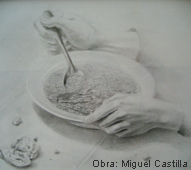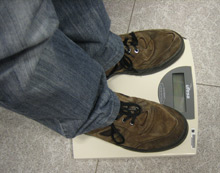 The Eating Disorders research has been a very important line of research inside the history of our team. Furthermore, currently the Obesity has become a priority. In this sense, we have validated several instruments and there are several more in process of validation.
• Body Esteem Scale (BES) (Jorquera, Baños, Perpiñá and Botella, 2005). This questionnaire consists of 35 items, assessing the feeling about 35 different body areas and attributes. It is scored at a five-point rating scale, from 1 (strong negative feelings) to 5 (strong positive feelings). • Eating Attitudes Test-26 (EAT-26). Validation of a Spanish Sample. (Jorquera M., Botella C.; Guillen V., Marco H., Baños RM., Botella C., Perpiñá C., 2006). The aim of this study focused on the validation of a Spanish sample, the 26-item version of the Eating Attitudes Test (EAT-26), developed by Garner and col. (1982). The EAT-26, probably constitutes one of the most standardized tools used in the evaluation of attitudes and behaviours typical in Eating Disorders (Anorexia and Bulimia Nervosa). Currently, obesity has become a priority in our fields of research. Several lines of research have been initiated, among which we can find the validation of the following scales: • Dutch Questionnaire of Eating Behaviour (DEBQ)-, adults and children version (van Strien et al., 1986): 33-item questionnaire which assesses three types of eating behavior, related to eating disorders and obesity, restrictive, emotional and external. • ECEQ (Matcht, 1999): Questionnaire that measures three types of eating behaviour (hunger, impulsive eating, sensory eating and hedonist eating) in six different emotional situations (anger, boredom, sadness, time without eating, strain and joy) • Children Questionnaire of Perceived Causes of Overweight (CICPS): 19 - item questionnaire which explores the children perception which is due to their own overweight. • Children Questionnaire of Reasons to Lose Weight (CIRP): 17 - item questionnaire that explores the reasons why a child can access a treatment to lose weight. | ||||
|
||||

 • The Situational Inventory of Body-Image Dysphoria-Short form (SIBID-S) (Perpiñá, Gallego, and Botella, 2006). This scale consists of 20 items to assess the frequency of dysphoric body-image emotions in certain situational contexts, using a five-point rating scale: 0 (never); 4 (always or almost never), given the frequency of dysphoric body image emotions.
• The Situational Inventory of Body-Image Dysphoria-Short form (SIBID-S) (Perpiñá, Gallego, and Botella, 2006). This scale consists of 20 items to assess the frequency of dysphoric body-image emotions in certain situational contexts, using a five-point rating scale: 0 (never); 4 (always or almost never), given the frequency of dysphoric body image emotions.